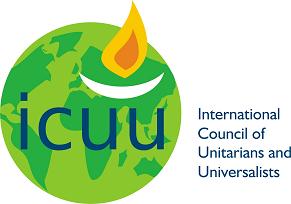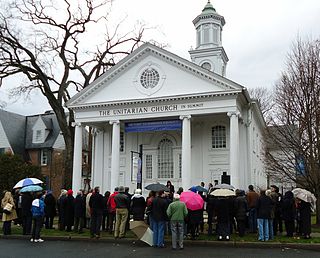
A creed, also known as a confession of faith, a symbol, or a statement of faith, is a statement of the shared beliefs of a community which summarize its core tenets.

The Canadian Unitarian Council (CUC) is a liberal religious association of Unitarian, Universalist, and Unitarian Universalist congregations in Canada. It was formed on May 14, 1961, initially to be the national organization for Canadians belonging to the Unitarian Universalist Association (UUA) which formed a day later on May 15, 1961. Between 1961 and 2002, almost all member congregations of the CUC were also members of the UUA and most services to congregations in Canada were provided by the UUA. However, in 2002, the CUC formally became a separate entity from the UUA, although the UUA continues to provide ministerial settlement services and remains the primary source for education and theological resources. Some Canadian congregations have continued to be members of both the CUC and the UUA, while most congregations are only members of the CUC.

The International Council of Unitarians and Universalists (ICUU) was an umbrella organization founded in 1995 comprising many Unitarian, Universalist, and Unitarian Universalist organizations. It was dissolved in 2021 along with the Unitarian Universalist Partner Church Council to make way for a new merged entity. Some groups represented only a few hundred people; while the largest, the Unitarian Universalist Association, had more than 160,000 members as of May 2011—including over 150,000 in the United States.

Unitarian Universalist Association (UUA) is a liberal religious association of Unitarian Universalist congregations. It was formed in 1961 by the consolidation of the American Unitarian Association and the Universalist Church of America, respectively. However, modern Unitarian Universalists see themselves as a separate religion with its own beliefs and affinities. They define themselves as non-creedal, and draw wisdom from various religions and philosophies, including humanism, pantheism, Christianity, Hinduism, Buddhism, Taoism, Judaism, Islam, and Earth-centered spirituality. Thus, the UUA is a religious group with liberal leanings.

Unitarian Universalism is a liberal religious movement characterized by a "free and responsible search for truth and meaning". Unitarian Universalists assert no creed, but instead are unified by their shared search for spiritual growth. Unitarian Universalists do not have an official, unified corpus of sacred texts. Unitarian Universalist congregations include many atheists, agnostics, deists, and theists; there are churches, fellowships, congregations, and societies around the world.

The Covenant of Unitarian Universalist Pagans is an independent affiliate of Unitarian Universalists who identify with the precepts of classical or contemporary Paganism: celebrating the sacred circle of life and guiding people to live in harmony with the rhythms of nature. CUUPS members foster the development of "liturgical materials based on earth- and nature-centered religious and spiritual perspectives" as well as encourage "greater use of music, dance, visual arts, poetry, story, and creative ritual in Unitarian Universalist worship and celebration." Many members of CUUPS embrace the cycle of seasons and beauty of all life forms found in nature. Unlike many mainline religious sects, Unitarian Universalists and Pagans both value the "sacredness in the present world rather than on an afterlife." CUUPS is a community open to all Unitarian Universalist members and those who support the tenets.

A variety of religious emblems programs are used by the Boy Scouts of America (BSA) to encourage youth to learn about their faith and to recognize adults who provide significant service to youth in a religious environment. These religious programs are created, administered and awarded by the various religious groups, not the BSA, but each program must be recognized by the BSA.
Flower Communion, also known as Flower Ceremony, Flower Festival, or Flower Celebration, is a ritual service common in Unitarian Universalism, though the specific practices vary between congregations. It is usually held on the last Sunday of worship in late May or June, as some congregations recess from holding services during the summer. Some congregations hold the ceremony earlier in the spring, sometimes coinciding with Mother's Day or Easter.
Southeast Unitarian Universalist Summer Institute (SUUSI) is an intergenerational community of approximately 1,000 people who gather each July. They describe themselves as a Unitarian Universalist (UU) summer camp. People attending SUUSI predominantly abide by the teachings of Unitarian Universalism, but many participants belong to other denominations or faiths. Attendees range in age from newborn to elderly.

Our Whole Lives, or OWL, is a series of six comprehensive sexuality curricula for children, teenagers, young adults and adults published by the Unitarian Universalist Association and the United Church of Christ Justice and Witness Ministries. Publication was the result of seven years of collaborative effort by the two faiths to prepare material which addresses sexuality throughout the lifespan in age appropriate ways.
Religious emblems programs also called religious recognition programs are awards set up by some religious organizations for members of various youth organizations.
General Assembly (GA) is an annual gathering of Unitarian Universalists of the Unitarian Universalist Association. It is held in June, in a different city in the United States every year. The last GA held outside the United States was in Quebec in 2002, after which congregations belonging to the Canadian Unitarian Council separated from the UUA. Member congregations send delegates and conventioneers to participate in the plenary sessions, workshops, regional gatherings, public witness events, and worship services. In recent years, attendance at each General Assembly has reached over 5,500.
Youth ministry, also commonly referred to as youth group, is an age-specific religious ministry of faith groups or other religious organizations, usually from ages 12 to 30, whose mission is to involve and engage with young people who attend their places of worship, or who live in their community. Christian youth ministry usually encompasses one or more of the following:

Unitarian Universalism, as practiced by the Unitarian Universalist Association (UUA), and the Canadian Unitarian Council (CUC), is a non-Creedal and Liberal theological tradition and an LGBTQ affirming denomination.

Religion in Scouting and Guiding is an aspect of the Scout method that has been practiced differently and given different interpretations in different parts of the world over the years.
Young Religious Unitarian Universalists (YRUU) is a term used within the Unitarian Universalist Association (UUA) in the United States and formerly the Canadian Unitarian Council. YRUU was an organization at the continental level primarily run by youth, ranging in age from 14 to 20, with mentoring adult partners. The continental organization of YRUU ended in 2008, but the term is still used by certain active youth groups and conferences at the congregational and district levels.
The Tennessee Valley Unitarian Universalist Church shooting was a mass shooting that occurred on July 27, 2008, when an unemployed Tennessee truck driver named Jim David Adkisson went on a shooting rampage at the Tennessee Valley Unitarian Universalist Church in Knoxville, Tennessee, United States. Adkisson opened fire on members of the congregation during a church youth performance, killing two people and wounding six others before he was restrained by church members; according to police, he had planned to keep shooting until the police arrived and killed him. A letter, or "manifesto", found in his vehicle after the shooting attributed his motivation for the rampage as a hatred of liberals, Democrats, African Americans, and homosexuals. In the letter he also described what he believed to be the cult-like atmosphere of the church. Adkisson pled guilty to two counts of murder and received a sentence of life in prison without parole.
Peter Morales is an American former president of the Unitarian Universalist Association. Morales was the UUA's first Latino president. In the early 2000s, he was the senior minister of the Jefferson Unitarian Church in Jefferson County, Colorado, a rapidly growing Unitarian Universalist congregation in the northwestern Denver-Aurora Metropolitan Area. He also worked for the UUA from 2002 to 2004. In 2008, he announced his candidacy for president, and in 2009 he was elected. As the result of a controversy regarding the UUA's hiring practices and charges of institutional racism, Morales resigned as president in 2017, three months before the end of the term.

All Souls Unitarian Church is a Unitarian Universalist (UU) church in Tulsa, Oklahoma. It is one of the largest UU congregations in the world.

Northwest Unitarian Universalist Congregation (Northwest) was organized in 1969. The organization of Northwest was the result of action taken by the Unitarian Universalist Congregation of Atlanta (UUCA) to establish a new congregation in the northwest suburbs of Atlanta.










